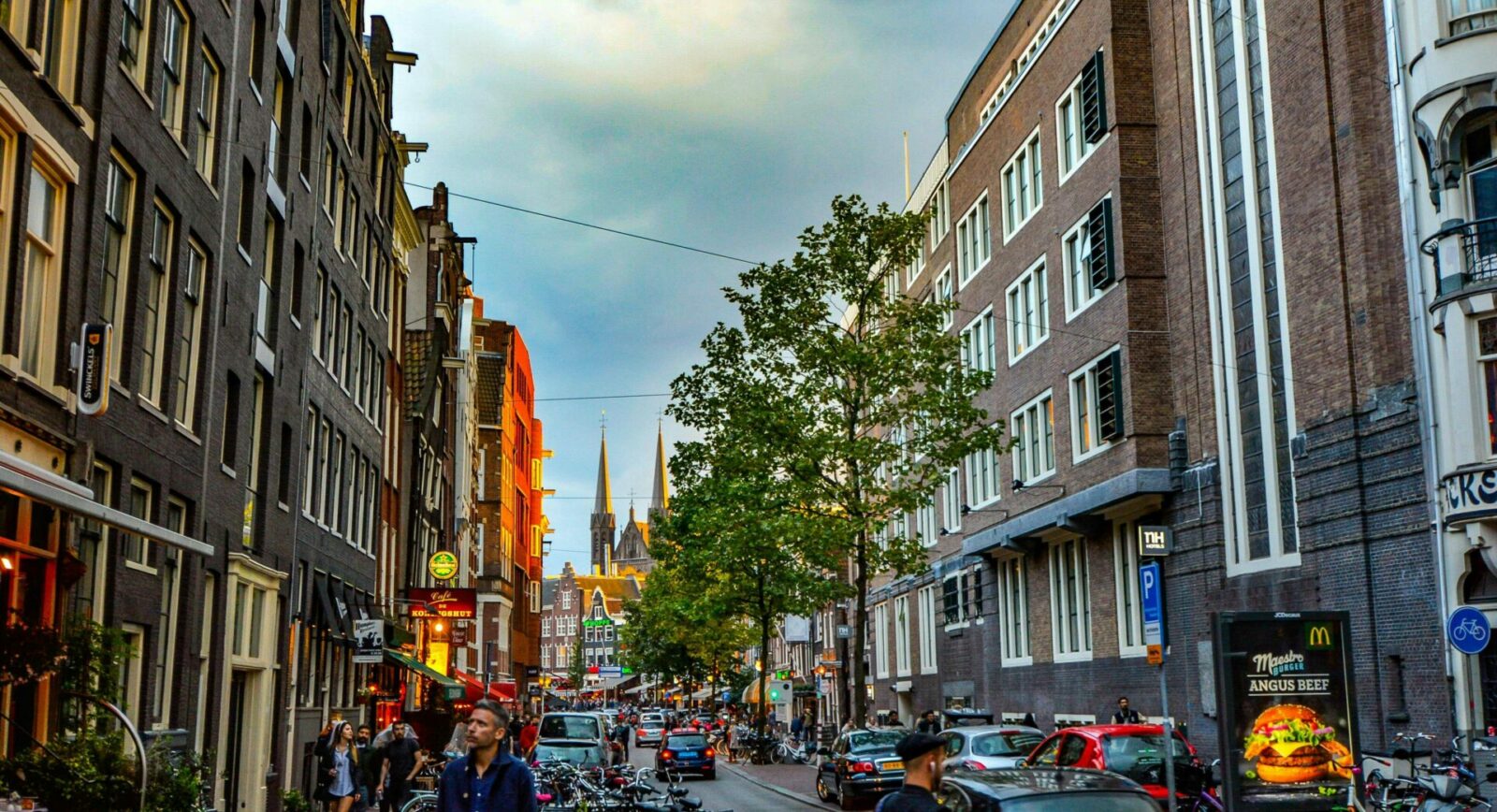Moving to the Netherlands can be stressful, especially if you’re leaving your home for a couple of months. You need to sort out paperwork regarding your new job and leave your home in good hands before you leave your country.
To help you with the process, we’ve created the ultimate checklist for when you’re moving to the Netherlands. Let’s see how it looks from start to finish. This is everything you need to know about how to move to the Netherlands.
1. Planning & Preparation
The first part of the process of moving to the Netherlands is planning and preparation. As scary as the move looks, you have to obtain information and prepare everything in advance in order for the move to go smoothly.
Research Visa Requirements
If you know someone who’s been in the Netherlands, hearing what it’s like to work and live there can bring a lot of value as you set your expectations. If they can shed some light regarding the visa requirements and how the process went, that would be amazing to hear first-hand.
If you’re moving from another EU country, you don’t need a visa. Also, you’re not required to get a residence permit or a work permit. You can simply find a job in the Netherlands, find accommodation, and move without worrying too much.
Can I move to the Netherlands without a job?
Moving to the Netherlands without a job is possible if you’re coming from an EU/EEA country or Switzerland, as you don’t need a visa to relocate to this country. However, if you’re not an EU/EEA/Swiss citizen, you need to have a strong reason to move to the Netherlands.
If you plan to stay for longer than 90 days, you’ll have to obtain a visa. Some people can apply after they arrive in the Netherlands via the Immigration and Naturalisation Service (IND), while others have to do it in advance with the Dutch embassy.
You can apply for the following visas:
- Student visa – which can be a temporary solution as international students need to leave the Netherlands after they finish their studies.
- Self-employment visa – you still need to have a job, but you’re not dependent on an employer in the Netherlands.
- Family-reunification visa – if you’re married to a Dutch citizen or resident, and your partner is ready to support you financially, you can immigrate to the Netherlands with this type of visa.
- Working holiday visa – this is a specific type of visa issued to young people (aged 18-30) coming from Argentina, Australia, Canada, Hong Kong, New Zealand, and South Korea and lasts up to one year.
- DAFT visa – if you’re an investor or entrepreneur coming from the US, the Dutch-American Friendship Treaty (DAFT) allows you to obtain a Dutch residence permit.
Requirements for moving to the Netherlands depend on the country you’re coming from. The best way to check is to contact the embassy and ask them how to immigrate to the Netherlands.
Plan Your Budget
Remember to prepare some money for the first few weeks. Living in the Netherlands isn’t a bargain and you’ll need to bring some money that will cover your first few weeks of living there. Jobs can pay weekly or monthly, so depending on the conditions, you can determine how much money you need.
What you decide to bring depends on the price of your accommodation, your first salary, and the city you’re staying in. For example, rent in Amsterdam is over €1,200, while some other cities are cheaper. You’ll need to pay for your utilities and for a month or a week’s worth of groceries.
Therefore, bringing €2,000 to €3,000 should be enough to keep you afloat in the first month, but the numbers can go up or down drastically depending on the arrangement. For example, if the company’s finding you accommodation, it can be a lot cheaper. Still, you need to have some money in case something unplanned happens.
Find Accommodation in the Netherlands

Finding accommodation is a crucial step in the process of moving to the Netherlands, but it is also the most difficult one.
The Netherlands struggles with accommodation, but if you’ve got a job through an employment agency, remember that they are obliged to provide you with a place to stay. Still, if you want to find your own home, you can do so, just inform them on time.
The reasons for finding your own accommodation can be comfort (you may not want to share your space with other workers and that’s fine) or if you’re travelling with someone, you want extra space.
If you’re wondering where you’ll live when you move to the Netherlands after we help you get the job, the agency will provide you with a summer home or some type of group accommodation, such as a hotel or private housing. Often, you’ll have to share a home or a room with other workers from your company or some other company that’s located nearby.
Learn Basic Dutch
Almost every job requires knowledge of the English language. The Netherlands is one of the countries where English is widely used, so knowing it is a must.
Do I need to speak Dutch to work in the Netherlands? The answer to that question is that English should be enough and you don’t have to worry that much about learning the language. However, learning the Dutch language is beneficial. It helps in daily interactions and professional settings. Many resources are available to help you learn Dutch, including online courses and local language schools.
You don’t have to master the language in a few months, but getting down to the basics will make your life in the Netherlands a lot more comfortable. Don’t be afraid to speak Dutch in public. The Dutch people are encouraging you to try to learn and use their language. When you have some time at home, try to write Dutch for a few minutes. This can help you have a better understanding of the language.
As you can see, learning Dutch is optional, but since you’re already moving to the Netherlands for a few months, you might as well get down to some basics.
2. Obtain Your Visa and Permits
There are different visas and permits you may need if you plan to move to the Netherlands. We’ll briefly analyse each one, but it’s up to you to determine what you need. Sort the paperwork on time to have a stress-free relocation.
- Residence Permit: A document allowing you to stay in the Netherlands for more than 90 days. It is necessary for non-EU citizens who intend to work or live in the country for an extended period of time.
- Temporary Stay Authorization (MVV): A visa is required for non-EU citizens planning to stay in the Netherlands for longer than 90 days. It is often the first step in obtaining a residence permit and must be applied for before entering the Netherlands.
- Work Visa: A visa that permits non-EU citizens to work in the Netherlands. It is typically tied to your employment and can vary based on the type of job and your qualifications.
- Highly Skilled Migrant Visa: A visa designed for highly skilled workers from non-EU countries. It allows employers to hire foreign talent more easily and is part of a streamlined process to attract skilled professionals.
- EU/EEA/Swiss Citizen: Citizens from EU, EEA countries, and Switzerland do not need a visa or residence permit to live and work in the Netherlands. They enjoy freedom of movement within the EU.
- Non-EU Citizen: Individuals from non-EU countries require a visa and residence permit to work in the Netherlands. They must comply with various immigration regulations and procedures to gain lawful employment and residency.
For all the information about visas and permits, you can contact IND (Immigration and Naturalisation Service). It is the Dutch government agency responsible for processing visa and residence permit applications, as well as overseeing immigration and naturalisation procedures. They provide guidelines and support for individuals moving to the Netherlands.
Once you obtain everything, you will be able to move to the Netherlands freely.
3. Organise Your Relocation
You’ve planned everything, got the paperwork ready and now it’s time to move to the Netherlands. This can be a stressful period, but hiring professionals to help you can make the entire process easier. Let’s see how to relocate to the Netherlands hassle-free.
Find Movers
Since you’re moving for a longer period of time, you’ll need to transport your belongings. If you’re travelling by car, you may be able to pack everything you need, but if you’re going by bus, you have to organise international movers.
Make sure you do this on time, as the movers require several weeks to organise your move and ship your belongings
Customs Regulations To Know About
Used household goods and personal effects can generally be imported duty-free if owned and used for at least six months, and you’ll need proof of residence outside the EU for the past 12 months. Prohibited items include firearms, drugs, certain plants and animals, and cultural artefacts, so check the Dutch customs website for a detailed list.
Proper documentation is crucial, including a customs declaration form, a valuation form, and any required import permits. While personal belongings are usually exempt from import duties, new items or those purchased within the last six months may incur VAT and import duties.
Move Your Pet
If you’re moving your pet with you, ensure they meet requirements such as microchipping, vaccinations, and a health certificate. They may need to have a proper passport, but this depends on the country you’re coming from.
Move With Your Family

Moving to the Netherlands alone is a lot easier than when you do so with your family. If you want to move to the Netherlands with your wife/husband, looking for such job offers is recommended.
Still, we recommend exploring regular jobs because you have better chances to get one and more opportunities to explore. Multiple people who’ve worked in the Netherlands managed to move their families over once they secured a long-term job and residence permit in the country.
Moving to the Netherlands with your family requires you to organise their health insurance as well. If you have a kid, they need to attend school. There’s a lot of paperwork, whether they’re going to international schools or a Dutch school. If your child isn’t yet registered (or doesn’t have a BSN number), it is possible to request a temporary education number from the Education Executive Agency (DUO).
Families coming outside the EU need to begin a civic integration process where they will learn about the culture and start adjusting to the new country. You have a total of three years to complete civic integration if the process is mandatory for you.
Register with Municipality
If you plan to live in the Netherlands for four months or longer, you’ll have to register with your municipality. You have to make an appointment and bring all the necessary paperwork. Remember to do this, as you will get your BSN (later about that), which is crucial for your day-to-day life in the Netherlands.
4. Settle in the Netherlands
Registering with your municipality is the first thing you have to do. There are some other things you have to sort out as soon as you start working.

Get the BSN Number
One of the first steps after moving to the Netherlands is obtaining your citizen service number (BSN). This unique number is essential for accessing various services. You get your BSN, as you register with the Dutch municipality. You’ll need a valid passport and residence document.
Ensuring all official documents, such as marriage certificates and birth certificates, are ready is crucial for people who move to the Netherlands permanently, but not for those going to work for several months.
Your employment agency might give you direction regarding BSN, which Dutch authorities issue to everyone staying in the Netherlands for a longer period of time. Your unique ID number will help you pay taxes, receive salaries, and do anything else during your stay in the Netherlands.
Open a Bank Account
Opening a bank account in the Netherlands is a priority. You’ll need your BSN, proof of address, and a valid residence permit. Choose a bank that caters to expats for ease of use or agree on a bank with your employment agency. Set up online banking and mobile apps for convenient transactions.
Get the Mandatory Dutch Health Insurance
When you’re moving to the Netherlands, one of the first things you need to sort out is your health insurance. The Dutch health insurance system is well-organized and you won’t have any issues sorting through the red tape.
Health insurance is mandatory for all residents and employees in the Netherlands. What you should know is that the health insurance system in the Netherlands operates under the guidance and regulation of the Dutch government, which ensures that the policies and practices followed by Dutch insurers align with national standards and goals for public health.
Health insurance in the Netherlands is divided into two main types:
- Basic health insurance (basisverzekering)
- Supplementary insurance (aanvullende verzekering).
Dutch insurers are responsible for offering basic health insurance that is compulsory and covers essential medical care, including visits to the general practitioner, hospital stays, and emergency care. This type of insurance is designed to provide a healthcare benefit to all insured individuals, so everyone has access to necessary medical services without facing financial hardship.
5. Start the Cultural Integration
It might take some time before you get used to the culture in the Netherlands. Dutch culture is unique in their business etiquette and transportation and it’s unlike any other country in the area. Understanding the country’s culture and meeting the people are crucial for settling in.
Use Public Transport
When you live in the Netherlands, you can do some things that will make your life easier. For example, public transport is efficient in the Netherlands. Obtain an OV-chipkaart for convenient travel on buses, trams, and trains.
Drive Your Car in The Netherlands
If you decide to drive, you need to check whether you need to have a Dutch driving licence. If you’re coming from one of the EU or EFTA countries with a valid licence, you can drive in the Netherlands for 15 years, or until the date your licence expires. This applies to categories from AM to BE. From C1 to DE, the limit is 5 years. However, the licence must be issued before your arrival, otherwise, you can’t drive in the Netherlands.
If you’re not an EU citizen, you can drive your car for up to 185 days in the Netherlands, after which you have to get a Dutch licence.
Shopping for Groceries
Shopping for groceries is easy, with numerous stores like Albert Heijn and Jumbo. Prices vary, so explore different stores to find the best deals. Consider local markets for fresh produce and unique items. Online grocery shopping is also available.
Keep Track of Your Finances
Keep in mind that living costs in the Netherlands can be high, so track your finances. If you’re travelling somewhere, arrange everything in advance, i.e., get a ticket, and plan your route to avoid unnecessary expenses.
Social and Business Etiquette
In short, the Dutch value punctuality, direct communication, and politeness. Keep in mind that your work colleagues are work colleagues and treat them as such. They’re friendly and open, but it’s rare for them to hang out after work as they prefer to get back home to their family or run errands.
The best way to learn about the culture is to observe how people behave once you get there. Still, you can get further information by reading online. We’ve written about some of the stereotypes about the Netherlands and what you can do to become comfortable and find friends.
Use Benefits for Expats
The Netherlands offers some benefits that depend on your income, but you may not receive all of them. These include:
- Childcare benefit (if you have children who attend daycare or out-of-school care, you are eligible to receive childcare benefit).
- Housing benefit (if you live in rented accommodation, you can receive housing benefit).
- Healthcare benefit (reserved for those who have Dutch health insurance).
While some nationalities can apply for their residence permit at the Immigration and Naturalisation Service (IND) upon arrival in the Netherlands, you might need to contact the Dutch embassy or consulate in your country of residence before your departure.
And when you’re moving with the family, we strongly advise checking everything in advance.
Stay in Touch With Your Family
No matter how much you prepare for the relocation, you’ll need some time to get used to it. At first, everything will be exciting, but as you settle in, you may start to feel homesick. To get over this difficult period, you can stay in touch with your family members and your loved ones.
Have regular phone calls and use their support to overcome this feeling almost everyone gets when they travel to a new country.
Additional Tips for a Smooth Transition
Everyone’s move to the Netherlands is different, but we’ve wanted to provide general tips for people who are coming both from the EU and outside the EU/EEA area.
- Start the civic integration process on time. Learn as much as you can about the culture, the country, and the language, as well as how their system works. It’s one thing when you’re living in the Netherlands as a tourist and completely different when you’re working.
- Explore the Dutch government website, as it contains all the necessary information for expats and people coming to work in the Netherlands.
- People who are living in the Netherlands for longer periods must pay taxes.
- Prepare documentation on time. Potential things you need to prepare before or immediately when you arrive in the Netherlands may include: a residence permit (or a temporary residence document), work permit, health insurance, BSN, and a bank account. Check the visa requirements as well.
- If you need clarification, it’s best to refer to the Dutch government website and Dutch immigration.
- Stay connected. Hanging out with other workers will help you get used to life in the Netherlands. Most of them have spent years working in the country, so you can get useful advice on what to do and what not to do.
- Learn about worker’s rights. The Netherlands is the country that provides the best working conditions to its residents and blue-collar workers from other countries. Learn some of the basic rights, especially regarding working hours, holidays, and employee benefits.
It’s important to note that every person is different, but these general tips should help you during your move. Planning as many things as you can is a good way to avoid any unwanted events. There’s a lot that can happen during the move and it’s important to always have a backup plan.
Moving to the Netherlands Starts After the Application Process With Robin
Moving to Holland is a lot easier when you find a job abroad, which is what Robin helps you with. The process of finding a job through Robin is simple, as our recruiters send you job opportunities that fit your profile. When you apply, we’ll guide you throughout the entire process.
If you get the job, the employment agency that will provide you with a working contract will also secure accommodation in the city where your company is located or nearby. Not having to worry about finding work and a place of residence makes the moving process a lot easier.
During the application process, you’ll have to know when you plan to arrive in the Netherlands. Most job offers have a start date, and getting to the country a couple of days prior will give you some time to settle. Also, you must determine how you plan to travel and if the agency should organise a pickup.
Those are the two things that you should know in advance and let our Robin recruiters know. Remember that if you’re staying for no more than 4 months, you can’t register with the municipality, but you can be registered as a non-resident in the Personal Records Database. The Personal Records Database contains information on all residents, as well as those who have left the country.
Final Thoughts
Moving to the Netherlands requires a lot of preparation, especially if you’re coming from a country that’s outside of the EU. If you’re one of those people, we advise you to check the website of the Dutch government, as they have all the necessary information for expats.
If you’re coming from one of the EU countries through Robin, this guide has got you covered. Once you land a job, choose the transportation option that works for you. It’s desirable to do some research on the country and the city you’ll be settled in and don’t forget to bring some money.
Arrive in the Netherlands a few days before you start working. The employment agency provides you with accommodation and they’ll help you with the necessary paperwork. You’ll need the citizen service number, or BSN, an account, and health insurance. According to the number of workers in your area, the agency also arranges for your transportation to work, and depending on the distance, you might get a bike, a car, or a company minibus or car to pick you up.
Don’t be afraid to explore the country and try to learn as much as you can about the language and the culture. This can help your daily routine significantly, but you don’t have to master Dutch, as the majority of the population speaks fluent English.
Most workers who’ve moved to the Netherlands through Robin have been satisfied with the overall experience and have even gone multiple times. Not only do we help you find a job in the Netherlands, but our recruiters stay in touch with you when you settle and start working to ensure everything goes smoothly and as agreed upon.
Register on robin.jobs, and let us help you find a job and settle in the Netherlands!
Frequently Asked Questions
Is it hard to move to the Netherlands?
Moving to the Netherlands can be straightforward with the right preparation and assistance from employment agencies like Robin, which help with job placements, accommodation, and navigating the immigration process.
Can a US citizen move to the Netherlands?
Yes, US citizens can move to the Netherlands. They need to secure a residence permit, have a job or be a student, and meet other requirements such as health insurance and sufficient financial resources.
Are there any downsides to living in the Netherlands?
Living in the Netherlands has potential downsides, including high living costs and housing shortages. However, proper planning and support from employment agencies can mitigate these issues.
How much money do you need to immigrate to the Netherlands?
The amount of money needed varies based on individual circumstances, but it’s recommended to bring enough to cover living expenses for the first few weeks. You should plan for initial accommodation, food, transport, and other necessities.
What is a Dutch Residence Permit?
A Dutch residence permit allows non-EU citizens to live and work in the Netherlands for a specified period. It is mandatory for stays longer than 90 days and requires proof of employment, sufficient income, health insurance, and sometimes a background check.
How can I move to the Netherlands permanently?
To move to the Netherlands permanently, secure a long-term residence permit through employment, education, or family reunification. You need a valid passport, proof of employment or enrollment, sufficient income, health insurance, and sometimes language proficiency.
Can a UK citizen move to the Netherlands?
Yes, UK citizens can move to the Netherlands. They need to follow post-Brexit immigration procedures, which include obtaining a residence permit, securing employment or demonstrating sufficient financial means, and having health insurance
Is it easy to get a job in Holland?
Finding a job in Holland can be easier with the help of recruitment agencies. When you look for a job with Robin, we help you find vacancies that fit your profile and assist throughout the application process, from preparing your CV to settling in your new role and county.
How much money should I have to move to the Netherlands?
It’s recommended to bring enough money to cover the first few weeks of living expenses, including accommodation, food, transport, and other necessities. The exact amount depends on your personal situation and lifestyle.
How can I live in the Netherlands without a job?
Living in the Netherlands without a job is possible if you meet other criteria, such as being a student or joining family members. You need sufficient financial resources, health insurance, and a residence permit. If you’re skilled in production, logistics, or some other departments in the blue-collar industry, send your CV to Robin recruiters, and we’ll do our best to find you a suitable job in the Netherlands and help you move there.
Can a foreigner settle in the Netherlands?
Yes, foreigners can settle in the Netherlands. They need a residence permit, proof of employment or sufficient income, health insurance, and possibly a civic integration exam.
What do I need to arrange if I’m moving to the Netherlands?
Arrange a residence permit, health insurance, and a BSN (citizen service number), and have your essential documents ready. Also, bring sufficient funds for initial expenses and arrange for accommodation.
Is the Netherlands inviting immigrants?
The Netherlands is generally welcoming to immigrants, especially those who meet economic and social criteria such as having a job offer, sufficient financial means, and health insurance. 95% of the population speaks English, which is one of the reasons foreigners
Is it hard to get a job in the Netherlands as a foreigner?
It can be easier to get a job in the Netherlands as a foreigner with the assistance of recruitment and employment agencies. At Robin, we help job seekers find suitable positions and secure work permits and everything else needed for a smooth relocation.
Can I get a work visa in the Netherlands without a job offer?
Generally, a job offer is required to obtain a work visa for the Netherlands, as it forms the basis for securing a residence permit.

 English
English  Lietuvių
Lietuvių  Latviešu
Latviešu  Polski
Polski  Português
Português  Română
Română  Slovenčina
Slovenčina  Magyar
Magyar  Русский
Русский  Espanol
Espanol  България
България  Čeština
Čeština  Italy
Italy  Croatia
Croatia  Greek
Greek 



